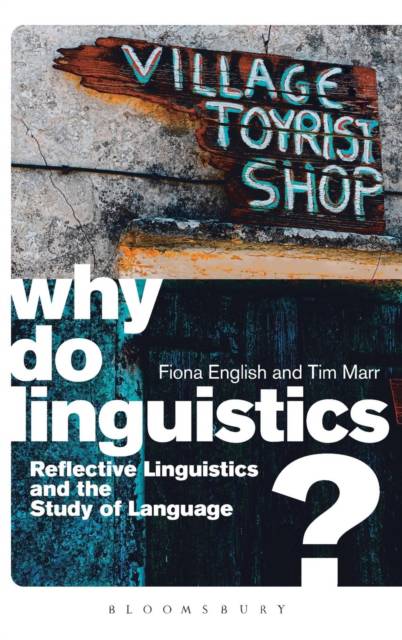
Bedankt voor het vertrouwen het afgelopen jaar! Om jou te bedanken bieden we GRATIS verzending (in België) aan op alles gedurende de hele maand januari.
- Afhalen na 1 uur in een winkel met voorraad
- In januari gratis thuislevering in België
- Ruim aanbod met 7 miljoen producten
Bedankt voor het vertrouwen het afgelopen jaar! Om jou te bedanken bieden we GRATIS verzending (in België) aan op alles gedurende de hele maand januari.
- Afhalen na 1 uur in een winkel met voorraad
- In januari gratis thuislevering in België
- Ruim aanbod met 7 miljoen producten
Zoeken
Why Do Linguistics?
Reflective Linguistics and the Study of Language
Fiona English, Tim Marr
Hardcover | Engels
€ 228,95
+ 457 punten
Uitvoering
Omschrijving
What do we need to know about language and why do we need to know it? This book shows how viewing the world through a linguistics lens can help us to understand how we communicate with each other and why we do it in the ways we do. Above all this book is about noticing. It is about encouraging readers to pay attention to the language that surrounds them.
The book addresses fundamental linguistic questions such as: Where do people's beliefs about language come from? Who decides what language we should speak? How do we choose the best way to express what we mean? It introduces a set of practical tools for language analysis and, using examples of authentic communicative activity including overheard conversations, Facebook posts and public announcements, shows how this kind of analysis works and what it can tell us about social interaction.
Exploring language and language use from a social, intercultural and multilingual perspective, the authors demonstrate the relevance of linguistics in understanding day-to-day interaction. This book will help readers not only to become informed, active observers of language for its own sake, but also to be able to take on and challenge some of the misconceptions, assumptions and prejudices that so often underlie public discussion of language issues.
The book addresses fundamental linguistic questions such as: Where do people's beliefs about language come from? Who decides what language we should speak? How do we choose the best way to express what we mean? It introduces a set of practical tools for language analysis and, using examples of authentic communicative activity including overheard conversations, Facebook posts and public announcements, shows how this kind of analysis works and what it can tell us about social interaction.
Exploring language and language use from a social, intercultural and multilingual perspective, the authors demonstrate the relevance of linguistics in understanding day-to-day interaction. This book will help readers not only to become informed, active observers of language for its own sake, but also to be able to take on and challenge some of the misconceptions, assumptions and prejudices that so often underlie public discussion of language issues.
Specificaties
Betrokkenen
- Auteur(s):
- Uitgeverij:
Inhoud
- Aantal bladzijden:
- 304
- Taal:
- Engels
Eigenschappen
- Productcode (EAN):
- 9781441110992
- Verschijningsdatum:
- 26/03/2015
- Uitvoering:
- Hardcover
- Formaat:
- Genaaid
- Afmetingen:
- 152 mm x 236 mm
- Gewicht:
- 589 g

Alleen bij Standaard Boekhandel
+ 457 punten op je klantenkaart van Standaard Boekhandel
Beoordelingen
We publiceren alleen reviews die voldoen aan de voorwaarden voor reviews. Bekijk onze voorwaarden voor reviews.









